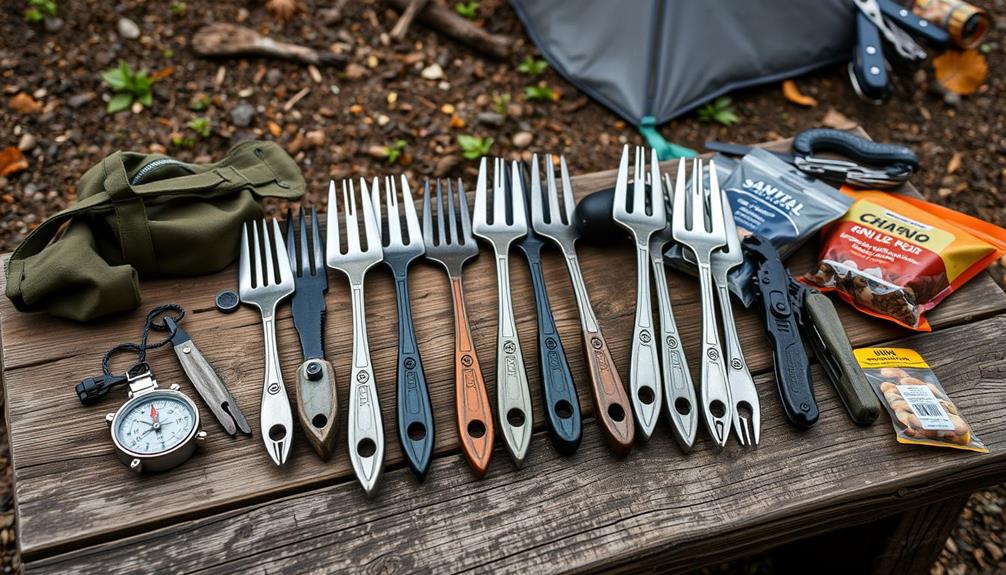To prep on a budget, focus on community connections, skill development, and sustainable methods. Join local prepper groups for shared knowledge and resource exchanges. Learn essential survival skills, like fire-making and foraging, through hands-on practice. Create emergency plans and regularly update them. Embrace sustainable practices, such as composting and vertical gardening, to maximize resources. Set a monthly budget for prepping and track your spending to find savings. Invest in versatile gear and maintain it well to avoid costly replacements. These strategies can set you on the right path, and sticking around will reveal even more valuable tips.
Key Takeaways
- Join local prepper groups to share resources and knowledge, fostering a supportive community while reducing individual costs.
- Develop essential survival skills like fire-making, shelter-building, and foraging to enhance self-sufficiency without relying on expensive gear.
- Create an emergency plan to organize supplies and roles, ensuring preparedness without overspending on unnecessary items.
- Utilize bulk buying and track sales to save money on non-perishable goods, maximizing your prepping budget effectively.
- Engage in hands-on practice with fellow preppers to enhance skills and build camaraderie, minimizing the need for costly courses.
Community Engagement Opportunities
Engaging with your local prepper community can considerably enhance your preparedness efforts and resources. By joining local prepper groups, you'll find a wealth of shared knowledge and experience.
Connecting with fellow preppers allows you to exchange resources, tips, and support, fostering a sense of camaraderie. Attend community events to build relationships and expand your network; you never know who might've valuable insights or skills to share.
Volunteering with local organizations not only boosts your experience but also strengthens ties within the community.
Explore bartering networks to trade items or skills, maximizing your preparedness without stretching your budget.
Utilizing community resources, like food banks during emergencies, can provide essential support when you need it most.
Developing Essential Survival Skills

Mastering essential survival skills is crucial for anyone looking to be well-prepared for emergencies.
These skills can make a significant difference when every second counts. Start honing your abilities by focusing on:
- Fire-making: Knowing how to start a fire can keep you warm, cook food, and signal for help.
- Shelter-building: Learning how to create a safe space protects you from harsh weather and potential threats.
- Foraging: Understanding edible plants can provide you with essential nutrition when resources are limited.
Creating Emergency Plans

Creating emergency plans is essential for any prepper, and regularly reviewing your strategies can greatly enhance your preparedness. Start by identifying potential disaster scenarios and conducting a threat assessment. Organize your emergency supplies and create a family emergency plan. Conduct regular drills to guarantee everyone knows their roles and communication strategies.
Here's a simple table to help you visualize your planning:
| Step | Action |
|---|---|
| Identify Scenarios | List potential disasters |
| Organize Supplies | Gather necessary items |
| Create Family Plan | Document roles and contacts |
| Conduct Drills | Practice emergency responses |
Emphasizing Sustainable Practices

Sustainable practices are essential for preppers looking to enhance their self-sufficiency and reduce reliance on external resources.
By incorporating these practices into your daily life, you can create a more resilient and eco-friendly lifestyle.
Here are three impactful strategies to contemplate:
- Composting: Turn kitchen scraps and yard waste into nutrient-rich soil, reducing landfill waste while enriching your garden.
- Rainwater Harvesting: Collect rainwater for irrigation, conserving water and ensuring a reliable source for your plants.
- Vertical Gardening: Maximize your food production space, even in small areas, while minimizing resource use.
These sustainable practices not only empower you but also support a healthier planet.
Start small, and watch how your self-sufficiency grows!
Maintaining Health and Wellness

Incorporating sustainable practices into your lifestyle not only boosts self-sufficiency but also sets the stage for maintaining your overall health and wellness.
Regular exercise is crucial; engage in activities like hiking, running, or bodyweight workouts to enhance your physical fitness. These exercises not only improve endurance but also keep your mind sharp.
Additionally, consider the benefits of essential oils for supporting various aspects of health, such as using essential oils for respiratory health to improve your breathing during physical activities.
Don't overlook the importance of stress management techniques—meditation, deep breathing, or yoga can greatly enhance your mental wellness.
Stay connected with supportive friends and family to foster emotional resilience.
Focus on outdoor activities to enjoy fresh air and nature, which can rejuvenate your spirit.
Conducting Research and Information Gathering

When you're prepping, gathering reliable information is essential for making informed decisions. Start by evaluating local risks and understanding your environment. This knowledge equips you to face challenges head-on.
Here are three strategies to enhance your research:
- Join online forums to exchange valuable insights and avoid common prepper mistakes.
- Create a library of PDFs and articles on prepping topics, so you have resources at your fingertips.
- Participate in community alert systems to stay updated on potential threats and environmental hazards.
Budgeting Techniques for Prepping

Gathering reliable information is key to prepping effectively, but so is managing your finances. Start by setting a monthly budget specifically for prepping.
Track your expenses to identify areas where you can cut costs and prioritize essential items. Consider bulk buying non-perishable goods to save money in the long run.
Keep an eye out for sales, discounts, and local co-ops to maximize your budget. Bartering with fellow preppers can also help you acquire gear without spending cash.
Regularly review your prepping budget to guarantee you're sticking to your financial goals. By being financially savvy, you can build your supplies gradually and sustainably, ensuring you're prepared without breaking the bank. Consider looking for cost-saving opportunities by purchasing in bulk or finding deals on essential prepping items. It’s also helpful to educate yourself on cost-effective alternatives, such as learning market hog raising basics to produce your own meat supply. By being mindful of your financial goals and continuously seeking ways to save, you can maintain a well-stocked supply without overspending.
Acquiring and Maintaining Gear

Acquiring and maintaining gear is essential for effective prepping, guaranteeing you're ready for any emergency. Investing in quality gear not only saves you money in the long run but also boosts your confidence in your preparedness.
Additionally, understanding the importance of cold medications overview can enhance your readiness for health-related emergencies. Here are three key items to focus on:
- Multi-tools: They're versatile and can handle various tasks, making them indispensable.
- Water filtration systems: Safe drinking water is vital; a reliable system is a must-have.
- First aid kits: Accidents happen—being equipped can save lives.
Regular maintenance of your gear is just as important; it extends its lifespan and effectiveness.
Research gear reviews before purchasing to guarantee you're making informed decisions. Stay prepared and keep your gear ready for action!
Practicing Survival Techniques

Practicing survival techniques is essential for ensuring you're prepared for any emergency situation. Start by engaging in hands-on scenarios like shelter building and fire-making.
You don't need expensive equipment; your backyard or local park can serve as the perfect training ground. Organize practice sessions with friends or fellow preppers to make learning more enjoyable and effective.
Utilize resources like YouTube for tutorials on essential skills such as foraging or knot tying. Remember, time and creativity are your best allies in honing these abilities.
Networking with experienced preppers can also enhance your learning and provide valuable insights. By consistently practicing these techniques, you'll build confidence and competence, ensuring you're ready for whatever challenges come your way.
Embracing Continuous Learning

Continuous learning is essential for preppers looking to stay ahead of potential challenges. By continually expanding your knowledge and skills, you can better prepare for whatever comes your way.
Engaging in activities like mastering bug out bags and composting can notably enhance your preparedness.
Here are three impactful ways to embrace continuous learning:
- Join Workshops: Participate in hands-on workshops to master vital survival skills like first aid and gardening.
- Utilize Online Resources: Explore free online courses or YouTube videos that cover various prepping topics to keep your skills sharp.
- Network with Others: Engage with local prepper communities to share experiences and learn from each other's journeys.
Frequently Asked Questions
How Can I Find Local Prepper Groups Near Me?
To find local prepper groups, search online for community forums or social media pages. Attend local events like fairs or workshops, and visit libraries or community centers where such groups might post flyers or announcements.
What Are Some Low-Cost Prepping Supplies I Should Prioritize?
You should prioritize multi-tools, first aid kits, water filtration systems, and non-perishable food items. Focus on quality and versatility, and consider bulk buying or bartering to save money while enhancing your prepping supplies.
How Do I Start a Bartering Network in My Community?
Starting a bartering network's like releasing a treasure hunt in your community! Gather local enthusiasts, host fun meetups, and create an online group. You'll swap skills and goods faster than you can say "trade!"
What Are Effective Ways to Store Food Long-Term on a Budget?
To store food long-term on a budget, you can use glass jars, vacuum-sealed bags, or food-grade buckets. Prioritize purchasing bulk items, and consider freezing or dehydrating food to extend its shelf life.
How Can I Assess My Family's Unique Emergency Risks?
To assess your family's unique emergency risks, identify potential threats in your area, analyze past incidents, and discuss concerns with family members. Create a prioritized list to focus on mitigating the most significant risks.
Conclusion
As you embrace these affordable strategies, you're not just preparing for the unexpected—you're building a lifeline for yourself and your loved ones. Picture the possibilities: a tight-knit community ready to face challenges together, skills honed and ready for action. But what happens when the moment arrives? Will you be equipped to respond? With each step you take, you're crafting a safety net. So, gear up, stay vigilant, and remember: the best preparation is just around the corner.










